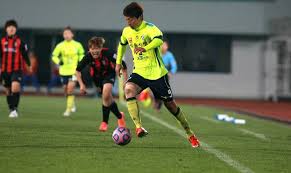By Andrew Warshaw
November 8 – South Korea’s women’s football league has been rocked by an unusual gender row that has led to the resignation of a team coach and prompted a major human rights dispute. Six of the seven K-League teams recently requested that star striker Park Eun-Seon, who plays for Seoul City Hall Amazones, undergo a gender test. They also asked Korea Women’s Football Federation (KWFF) to bar Park from playing until her gender is verified.
Park was the league’s leading goalscorer in the 2013 season and the Seoul City management have accused rival clubs of serious violations.
“Demanding a gender examination on a person is a serious human rights violation that insults someone’s character,” the club said in statement, demanding an immediate apology and threatening legal action.
A spokeswoman for the National Human Rights Commission of Korea told AFP they had received a petition requesting an investigation into whether Park’s rights had been violated.
One of the six coaches who had sent the original request to the KWFF said he was resigning. “We were only questioning why Park hadn’t been on the national team even though she’s the best female player,” said Lee Sung-Gyun, coach of the Suwon FMC club.
Park’s gender has been questioned before, most recently before the 2010 AFC Women’s Asian Cup, when host nation China raised the issue. She was not selected for the tournament.
Previous questions raised by the Korean media about her gender have focused on her height and strong build. But writing on her Facebook page, Park, who played for South Korea at the 2003 women’s World Cup and has won 19 caps, said she felt “humiliated” by the row and revealed that she had undergone several gender tests in the past.
“I’ve worked so hard to get to this point, and I will not give up so easily,” she wrote. “I know what these people are trying to do, and I won’t fall down.”
Local media reported that the six WK-League clubs threatened to boycott the league unless a gender test was taken but Amazones coach Seo Jung-ho was furious the case even came to light.
“This should not have happened,” he said. “It is just so terrible to see the coaches, who should be mustering wisdom for the future of Korean women’s football, colluding to hurt one of our best players.”
The most high-profile recent case of gender testing in sport was that of South Africa’s Caster Semenya following her victory in the women’s 800 metres at the 2009 World Athletics Championships.
Contact the writer of this story moc.l1745292910labto1745292910ofdlr1745292910owedi1745292910sni@w1745292910ahsrw1745292910.werd1745292910na1745292910


